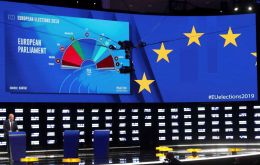MercoPress. South Atlantic News Agency
Tag: European elections
-
Monday, May 27th 2019 - 08:41 UTC
European elections turnout rises for the first time in four decades

Around half of the eligible voters cast their ballot in European elections; a bloc-wide estimate showed on Sunday, the first time turnout has risen in four decades of continent-wide voting. The increased enthusiasm was seen by some commentators as a response to challenges ranging from climate change to the rise of euro-sceptic parties.
-
Monday, May 27th 2019 - 08:39 UTC
Europe's centre parties take significant electoral defeat

Europeans turned their backs on traditional center-left and center-right candidates in Sunday's elections for the European Parliament, according to provisional results and their projections.
-
Wednesday, April 17th 2019 - 09:49 UTC
Dissident Labour and Tory MPs register as “Change UK”, and plan to participate in EU elections

The Electoral Commission has approved The Independent Group's application to register as a political party. The group - made up of 11 former Labor and Tory MPs who their parties in February, will become Change UK. The approval means they can put forward candidates in the European elections due to take place on 23 May - if the UK has not left the EU by then.
-
Tuesday, April 16th 2019 - 06:24 UTC
“Absolute priority” for UK government to leave the EU by 23 May to avoid European elections

It is an “absolute priority” for the government to leave the EU by 23 May to avoid having to take part in European elections, Jeremy Hunt has said. The foreign secretary said the public would find it “hugely disappointing” to be asked to send MEPs to Brussels.
-
Saturday, March 30th 2019 - 07:45 UTC
The Independent Group applies to become political party and field candidates for EU parliament election

The Independent Group (TIG) of MPs has applied to become a political party to take part in European elections in May if they go ahead. The group intends to call itself Change UK, and has named Heidi Allen as its interim leader.
-
Monday, May 26th 2014 - 07:26 UTC
Farage and the UKIP in course for a 'shockwave' victory in European elections

The UK Independent Party, UKIP, is course for an emphatic victory in the European elections in the UK - with leader Nigel Farage promising to use it as a springboard for next year's general election.
-
Wednesday, April 23rd 2014 - 05:47 UTC
UK Independent party EU election posters considered 'racist'

United Kingdom's Independent Party, (UKIP), Britain's anti-EU party, launched its campaign for next month's European elections fending off accusations from rival lawmakers that its pre-election posters were racist.
